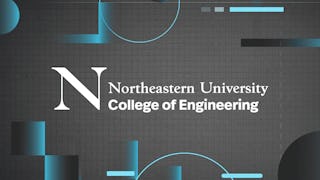This course covers practical algorithms and the theory for machine learning from a variety of perspectives. Topics include supervised learning (generative, discriminative learning, parametric, non-parametric learning, deep neural networks, support vector Machines), unsupervised learning (clustering, dimensionality reduction, kernel methods). The course will also discuss recent applications of machine learning, such as computer vision, data mining, natural language processing, speech recognition and robotics. Students will learn the implementation of selected machine learning algorithms via python and PyTorch.



Kompetenzen, die Sie erwerben
- Kategorie: Regression Analysis
- Kategorie: Statistical Machine Learning
- Kategorie: Applied Machine Learning
- Kategorie: Scikit Learn (Machine Learning Library)
- Kategorie: Supervised Learning
- Kategorie: Classification And Regression Tree (CART)
- Kategorie: Probability & Statistics
- Kategorie: Data Processing
- Kategorie: Statistical Methods
- Kategorie: Machine Learning
- Kategorie: Predictive Modeling
- Kategorie: Machine Learning Algorithms
- Kategorie: Statistical Modeling
- Kategorie: Linear Algebra
- Kategorie: Data Science
- Kategorie: Feature Engineering
Wichtige Details

Zu Ihrem LinkedIn-Profil hinzufügen
August 2025
9 Aufgaben
Erfahren Sie, wie Mitarbeiter führender Unternehmen gefragte Kompetenzen erwerben.

In diesem Kurs gibt es 7 Module
This week’s module introduces the field of statistical learning, exploring its scope and practical applications across various domains. Students will analyze how statistical learning techniques are used to make predictions, infer relationships, and uncover patterns in complex datasets. The module also reviews the key concepts essential for success in the course, including statistical models, data handling, and learning algorithms. By the end of the module, students will have a solid understanding of statistical learning principles and be prepared to apply them in real-world scenarios, laying the foundation for deeper exploration in machine learning and data science.
Das ist alles enthalten
2 Videos6 Lektüren1 Aufgabe1 Diskussionsthema
This week’s module introduces you to the concept of Maximum Likelihood Estimation (MLE) and its application in statistical modeling. Through this material, you will gain a thorough understanding of how to mathematically implement MLE and apply it to real-world datasets. First, we will revisit foundational concepts of convex optimization, offering a solid foundation in optimization techniques. We will also explore the iterative process of the gradient descent algorithm, allowing you to understand and implement this method for finding optimal solutions in machine learning models. Through a combination of theoretical knowledge and practical application, you will build essential skills in statistical estimation and optimization, preparing for advanced studies in machine learning and data analysis.
Das ist alles enthalten
2 Videos3 Lektüren2 Aufgaben
In this module, you will gain a comprehensive understanding of supervised machine learning, from model training to evaluation. Specifically, you will interpret each step in the learning process and apply training and evaluation techniques to real-world data. This will enable you to fit and assess models, while addressing issues like overfitting and underfitting. By understanding the bias-variance trade-off, you can optimize models for greater accuracy and reliability. We will also cover cross-validation methods, further equipping you with robust tools for model assessment and performance analysis. In short, this week’s learning combines theoretical insights with hands-on programming, preparing you for advanced work in machine learning.
Das ist alles enthalten
2 Videos4 Lektüren2 Aufgaben
This week, we will focus on the foundational principles of linear regression, a key technique in predictive modeling. You will learn to apply linear regression models and derive the ordinary least squares (OLS) formulation, gaining insight into how OLS is used to fit data accurately. We will also cover solution methods, including gradient descent and convex optimization, which provide a toolkit for efficient model training. Finally, you will explore regularization techniques to enhance model robustness and prevent overfitting. By implementing these regularized regression models in Python, you will gain hands-on experience in model optimization.
Das ist alles enthalten
1 Video3 Lektüren1 Aufgabe
This week, we will dive into advanced techniques for linear regression, with a focus on regularization. You will have the opportunity to explore the concepts of Lasso and Ridge regression and learn how to formulate and apply these regularization methods to linear models. The module also covers polynomial regression, allowing you to fit more complex nonlinear relationships within data. Through hands-on exercises, you will implement Lasso, Ridge, and polynomial regression models in Python. By the end of this week, you will have the practical knowledge needed to apply regularized regression techniques effectively, making the models more resilient and adaptable in real-world scenarios.
Das ist alles enthalten
1 Video3 Lektüren1 Aufgabe
This week’s module offers a comprehensive introduction to logistic regression, a fundamental technique in classification tasks. You will learn to apply logistic regression to binary and multi-class classification problems, starting with the derivation of the maximum likelihood formulation specific to logistic models. We will also explore generalized linear models (GLMs) and their application in classification, broadening your understanding of model flexibility across various scenarios. Practical exercises focus on implementing logistic regression in Python, enabling you to gain hands-on experience with real-world data. By the end of this module, you will be well-prepared to tackle classification challenges with logistic regression and GLMs, applying statistical theory alongside programming skills.
Das ist alles enthalten
2 Videos3 Lektüren1 Aufgabe
This week, we introduce Support Vector Machines (SVMs) as a powerful tool for discriminative classification. You will start by understanding the mathematical formulation of SVMs, focusing on margin optimization to maximize model separation between classes. We then delve into various kernel functions—linear, polynomial, and Gaussian—highlighting their unique applications and effects on classification. You will also learn techniques for hyperparameter tuning to optimize SVM performance, adapting models for complex datasets. You will also gain hands-on experience in building and refining SVM models to effectively use SVMs for a wide range of classification tasks in machine learning.
Das ist alles enthalten
1 Video4 Lektüren1 Aufgabe
Erwerben Sie ein Karrierezertifikat.
Fügen Sie dieses Zeugnis Ihrem LinkedIn-Profil, Lebenslauf oder CV hinzu. Teilen Sie sie in Social Media und in Ihrer Leistungsbeurteilung.
Dozent

Mehr von Probability and Statistics entdecken
 Status: Vorschau
Status: VorschauNortheastern University
 Status: Kostenloser Testzeitraum
Status: Kostenloser TestzeitraumIllinois Tech
 Status: Kostenloser Testzeitraum
Status: Kostenloser TestzeitraumUniversity of Colorado Boulder
 Status: Kostenloser Testzeitraum
Status: Kostenloser TestzeitraumPolitecnico di Milano
Warum entscheiden sich Menschen für Coursera für ihre Karriere?





Neue Karrieremöglichkeiten mit Coursera Plus
Unbegrenzter Zugang zu 10,000+ Weltklasse-Kursen, praktischen Projekten und berufsqualifizierenden Zertifikatsprogrammen - alles in Ihrem Abonnement enthalten
Bringen Sie Ihre Karriere mit einem Online-Abschluss voran.
Erwerben Sie einen Abschluss von erstklassigen Universitäten – 100 % online
Schließen Sie sich mehr als 3.400 Unternehmen in aller Welt an, die sich für Coursera for Business entschieden haben.
Schulen Sie Ihre Mitarbeiter*innen, um sich in der digitalen Wirtschaft zu behaupten.
Häufig gestellte Fragen
To access the course materials, assignments and to earn a Certificate, you will need to purchase the Certificate experience when you enroll in a course. You can try a Free Trial instead, or apply for Financial Aid. The course may offer 'Full Course, No Certificate' instead. This option lets you see all course materials, submit required assessments, and get a final grade. This also means that you will not be able to purchase a Certificate experience.
When you purchase a Certificate you get access to all course materials, including graded assignments. Upon completing the course, your electronic Certificate will be added to your Accomplishments page - from there, you can print your Certificate or add it to your LinkedIn profile.
You will be eligible for a full refund until two weeks after your payment date, or (for courses that have just launched) until two weeks after the first session of the course begins, whichever is later. You cannot receive a refund once you’ve earned a Course Certificate, even if you complete the course within the two-week refund period. See our full refund policy.
Weitere Fragen
Finanzielle Unterstützung verfügbar,
 enthalten
enthalten
